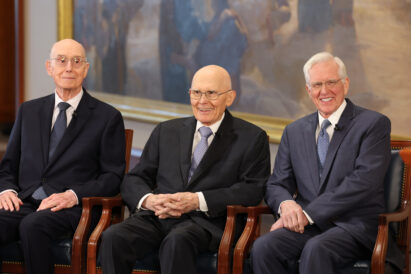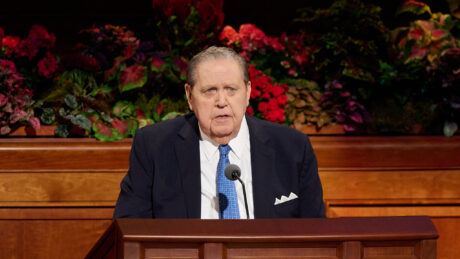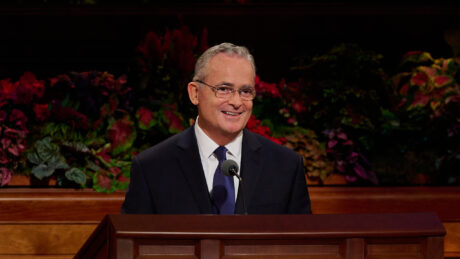Conference Counsel: The importance and power of integrity
- Elder Jack N. Gerard, General Authority Seventy, speaks during the morning session of the 194th Annual General Conference of The Church of Jesus Christ of Latter-day Saints on Saturday, April 6, 2024.
- Ryan Comer

Photo supplied, Intellectual Reserve
Elder Jack N. Gerard, General Authority Seventy, speaks during the morning session of the 194th Annual General Conference of The Church of Jesus Christ of Latter-day Saints on Saturday, April 6, 2024.
I was baptized into The Church of Jesus Christ of Latter-day Saints when I was 8 years old. When it comes to my conversion — my sincere belief through a witness from the Holy Ghost that The Church of Jesus Christ of Latter-day Saints is truly Christ’s restored church on the earth — that came experience by experience over time.
One experience that led to my conversion was hearing Joseph Smith’s story. To the ordinary person, a vision that includes seeing God the Father and Jesus Christ is almost too fantastic to believe. Could such a thing really happen? Can someone really be sure that it did happen to Joseph? I came to know that Joseph was telling the truth in large part because of how he described his reaction to the persecution he faced after he shared what happened to him with others. He said:
“However, it was nevertheless a fact that I had beheld a vision. I have thought since, that I felt much like Paul, when he made his defense before King Agrippa, and related the account of the vision he had when he saw a light, and heard a voice; but still there were but few who believed him; some said he was dishonest, others said he was mad; and he was ridiculed and reviled. But all this did not destroy the reality of his vision. He had seen a vision, he knew he had, and all the persecution under heaven could not make it otherwise; and though they should persecute him unto death, yet he knew, and would know to his latest breath, that he had both seen a light and heard a voice speaking unto him, and all the world could not make him think or believe otherwise.
“So it was with me. I had actually seen a light, and in the midst of that light I saw two Personages, and they did in reality speak to me; and though I was hated and persecuted for saying that I had seen a vision, yet it was true; and while they were persecuting me, reviling me, and speaking all manner of evil against me falsely for so saying, I was led to say in my heart: Why persecute me for telling the truth? I have actually seen a vision; and who am I that I can withstand God, or why does the world think to make me deny what I have actually seen? For I had seen a vision; I knew it, and I knew that God knew it, and I could not deny it, neither dared I do it; at least I knew that by so doing I would offend God, and come under condemnation.” (Joseph Smith–History 1:24-25)
During the general conference of The Church of Jesus Christ of Latter-day Saints in April, Elder Jack N. Gerard of the Seventy discussed the attribute of integrity, which he defined as being “true to God, to each other and to our divine identity.” Joseph Smith had integrity. He was true to God, true to others and true to his divine identity. I could feel his integrity through his words, and I knew that he was telling the truth.

Ryan Comer, Standard-Examiner
Ryan Comer
In his talk, Elder Gerard discussed the one person who showed more integrity than anyone else.
“In the closing hours of the savior’s ministry, he went to the Mount of Olives into a garden called Gethsemane and invited his disciples to wait. (Matthew 26:30, 36; Luke 22:39-41) Now alone, he petitioned his Father, ‘If thou be willing, remove this cup from me.’ (Luke 22:42) Being in agony, his suffering caused him, ‘even God, the greatest of all, to tremble because of pain, and to bleed at every pore, … and would that (he) might not drink the bitter cup, and shrink.’ (Doctrine and Covenants 19:18) Yet in the moment of deep despair, the savior did not shrink ‘but partook and finished (his) preparations unto the children of men.’ (Doctrine and Covenants 19:19)
“As the only begotten of the Father, Jesus Christ had power over death, pain and suffering but did not shrink. He fulfilled the covenant he had made with his Father and, in doing so, manifested a Christlike attribute increasingly important in the world in which we live — the attribute of integrity. He remained true to God, to each of us, and to His divine identity.”
Speaking to the importance of integrity, Elder Gerard highlighted that it was recently added to the “Preach My Gospel” missionary manual as a Christlike attribute.
“Integrity flows from the first great commandment to love God,” Elder Gerard said. “Because you love God, you are true to him at all times. You understand that there is right and wrong and there is absolute truth — God’s truth. Integrity means we do not lower our standards or behavior to impress or to be accepted by others. You ‘do what is right’ and ‘let the consequence follow.'”
A key test of integrity is the consistency between your public and private behavior. If people saw you in private, would they see what you allow them to see in public? Do you, as the phrase goes, practice what you preach?
Elder Gerard was led to ponder these questions during an experience with Elder Dieter F. Uchtdorf of the Quorum of the Twelve Apostles.
“A number of years ago, Elder Uchtdorf was assigned to reorganize our stake,” Elder Gerard said. “During our interview, he asked me a question I have not forgotten: ‘Has there been anything in your life that, if brought to the attention of the public, would be an embarrassment to you or the church?’ Surprised, my mind quickly raced over my entire life, trying to recall those moments when I may have fallen short and asking myself, ‘If others knew everything I had done, what would they think of me or the church?’
“In the moment, I thought Elder Uchtdorf was only asking about worthiness, but I’ve come to understand it was really a question about integrity. Was I true to what I professed? Would the world see consistency between my words and my deeds? Would others see God through my conduct?
“President Spencer W. Kimball taught, ‘integrity’ is our ‘willingness and ability to live by our beliefs and commitments.'”
We all make mistakes and fall short, but do we just accept those shortcomings as if they are a part of our identity and do nothing about them? Do we just say to ourselves, “Well, I am who I am,” or “Well, nobody’s perfect, so what does it matter?” How many times have you heard someone say something to the effect of, “Given all the truly horrible things going on in the world, what does it matter if I do this thing?” There are many justifications that Satan feeds us to convince us to be comfortable with weakness and sin. Having integrity by being true to God involves rejecting those ideas, no matter how compelling and logical they may seem.
Speaking more in depth about being true to God, true to others and true to our divine identity, Elder Gerard spoke of Daniel from the Old Testament.
“Daniel was always true to God,” Elder Gerard said. “His jealous peers ‘sought to find occasion against (him)’ (Daniel 6:4) and contrived a decree mandating prayers to their gods alone. Daniel knew of the decree but went home and — with ‘his windows being open’ (Daniel 6:10) — knelt and prayed three times a day to the God of Israel. As a result, Daniel was cast into the lions’ den. On the morn, the king found Daniel’s God had delivered him and issued a new decree that all should ‘tremble and fear before the God of Daniel: for he is the living God.’ (Daniel 6:26)
“The king came to know God through Daniel’s integrity. Others see God through ours — words and deeds. Just like Daniel, being true to God will increasingly set us apart from the world.”
Daniel showed integrity, and because of that, he inspired the king. This is the power we have. We often lament the lack of integrity in society, but it starts with us. What are we doing to help other people develop integrity?
Elder Gerard continued:
“The savior reminds us, ‘In the world ye shall have tribulation: but be of good cheer; I have overcome the world.’ (John 16:33) President Russell M. Nelson counseled: ‘(Overcoming the world) means overcoming the temptation to care more about the things of this world than the things of God. It means trusting the doctrine of Christ more than the philosophies of men.’ Likewise, we must resist the temptation to walk ‘in (our) own way, and after the image of (our) own god, whose image is in the likeness of the world.’ (Doctrine and Covenants 1:16)
“The oppositional pull of this world is an essential part of God’s plan of salvation. How we respond to the pull is the essence of who we are — a measure of our integrity. The worldly pull can be as direct as to destroy fidelity in marriage or as subtle as posting anonymous comments critical of church doctrine or culture. Exercising integrity in our choices is an outward expression of an inner commitment to follow the savior Jesus Christ.”
Being true to God seems pretty straightforward: Follow God’s commandments and do what he wants you to do even when it is not convenient. Being true to others seems a little more complicated. Dictionary.com defines being true to someone as being loyal and faithful to someone. But how can we be true to someone (i.e., loyal and faithful to them) if they are not doing what we know is right? We obviously don’t want to condone their behavior, so how can we be true to them?
Elder Gerard explained: “Just as integrity flows from the first great commandment to love God, being true to each other flows from the second, to love our neighbors as ourselves. A life of integrity is not a life of perfection; it is a life in which we strive every day to foremost be true to God and within that context to be true to others. President Oaks reminds us, ‘Our zeal to keep (the) second commandment must not cause us to forget the first.'”
In order to learn how to be true to others, one can look at how Jesus was true to those around him. Consider his experience with the woman caught in adultery:
“And the scribes and Pharisees brought unto him a woman taken in adultery; and when they had set her in the midst,
“They say unto him, Master, this woman was taken in adultery, in the very act.
“Now Moses in the law commanded us, that such should be stoned: but what sayest thou?
“This they said, tempting him, that they might have to accuse him. But Jesus stooped down, and with his finger wrote on the ground, as though he heard them not.
“So when they continued asking him, he lifted up himself, and said unto them, He that is without sin among you, let him first cast a stone at her.
“And again he stooped down, and wrote on the ground.
“And they which heard it, being convicted by their own conscience, went out one by one, beginning at the eldest, even unto the last: and Jesus was left alone, and the woman standing in the midst.
“When Jesus had lifted up himself, and saw none but the woman, he said unto her, Woman, where are those thine accusers? hath no man condemned thee?
“She said, No man, Lord. And Jesus said unto her, Neither do I condemn thee: go, and sin no more.” (John 8:3-11)
Jesus didn’t condone what the woman did. This was obvious by his admonition to “go and sin no more.” But he also didn’t condemn her.
Likewise, we are true to others when we treat them with respect and don’t condemn them, even if we don’t condone their behavior.
Elaborating on the need to be true to others within the context of being true to God, Elder Gerard said:
“The world increasingly grapples with integrity by imposing codes of conduct or ethical rules that govern the relationships between people and institutions. While good, these rules are generally not anchored in absolute truth and tend to evolve based on cultural acceptance. Similar to the question posed by Elder Uchtdorf, some organizations train employees to consider what their decisions or decision-making process would look like if published online or on the front page of a major newspaper. As the church comes out of obscurity and darkness (Doctrine and Covenants 1:30), we, like Daniel, must rise above the worldly expectations and become the face of the true and living God at all times and in all places. (Mosiah 18:9)
“Saying we have integrity is insufficient if our actions are inconsistent with our words. Likewise, Christian kindness is not a substitute for integrity. As a covenant people, and as leaders of his church, we must be beyond reproach and aligned with the standards the Lord has set.
“Acting with integrity builds faith and trust and reassures others that we seek only to do the will of the Lord. In our councils, we resist outside influences and follow the Lord’s revealed process, seeking insights from each woman and man and acting consistent with the inspired counsel received. (Doctrine and Covenants 42:2-3)
“Our focus is on the savior, and we are careful to avoid actions that may be perceived as serving our own interests, benefiting our family or favoring someone at the expense of another. We go out of our way to avoid any perception that our actions may be influenced by the honors of men (Doctrine and Covenants 121:35), to receive personal recognition, generate more likes, be quoted or published.”
For the third aspect of integrity — being true to our divine identity — I like that Elder Gerard used the words “divine identity.” I read and hear a lot about being true to your authentic self. But this “authentic self” spoken of is limited, with no consideration given to someone’s eternal nature. Being true to our divine identity involves recognizing who we really are — spirit sons and daughters of the same Heavenly Father — and behaving according to that knowledge.
“We know some who were not (true to their divine identity),” Elder Gerard said. “Of particular significance is the anti-Christ Korihor, who led away the hearts of many, appealing to their ‘carnal mind.’ (Alma 30:53) Yet, in the final moments of his life, he confessed, ‘I always knew that there was a God.’ (Alma 30:52) President Henry B. Eyring has taught that lying ‘is contrary to the nature of our spirits,’ our divine identity. Korihor deceived himself, and the truth was not in him. (1 John 1:8)
“In contrast, the Prophet Joseph Smith confidently proclaimed, ‘I knew it, and I knew that God knew it, and I could not deny it.’ (Joseph Smith–History 1:25)
“Joseph’s brother Hyrum was loved by the Lord ‘because of the integrity of his heart.’ (Doctrine and Covenants 124:15) He and Joseph remained true to the end — true to their divine identity, the light and knowledge they received, and true to the person they knew they could become.”
If we wonder how we can be true to God and true to others, I would submit that being true to our divine identity is the key. If we always remember who we really are and are true to that, then we will be sure to “mourn with those that mourn; yea, and comfort those that stand in need of comfort, and to stand as witnesses of God at all times and in all things, and in all places that ye may be in, even until death,” (Mosiah 18:9) a perfect description of being true to God and to others.
Said Elder Gerard in conclusion:
“May we reconcile ourselves ‘to the will of God’ (2 Nephi 10:24) and develop the Christlike attribute of integrity. May we follow our exemplar, the savior of the world, and not shrink but live a life that is true to God, to each other and to our divine identity.
“As Job said, ‘Let me be weighed in an even balance, that God may know mine integrity.'” (Job 31:6)
Contact Ryan Comer at rcomer@standard.net. Follow him on Facebook at https://www.facebook.com/





